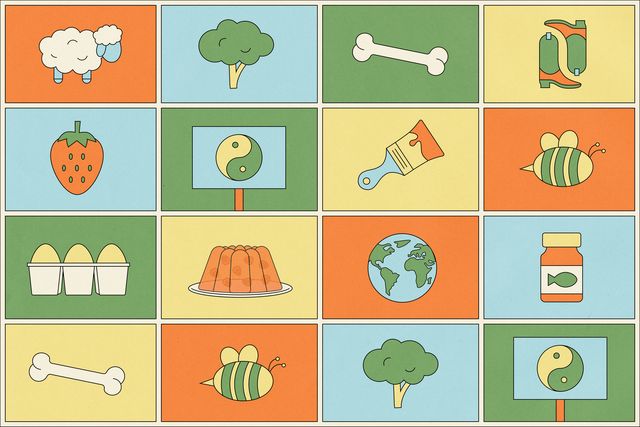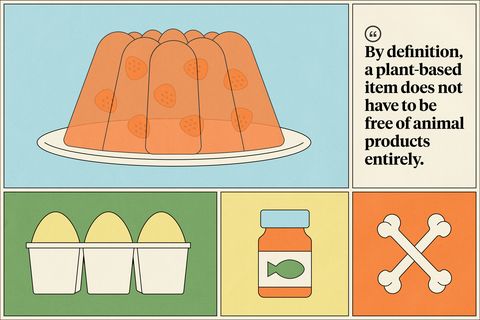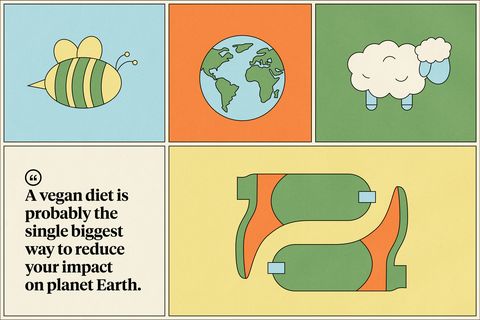Of all the varying food and lifestyle words and phrases currently floating around, two terms are growing rapidly in popularity around the world: vegan and plant-based. In fact, plant-based foods just eclipsed a record-breaking $8 billion mark in U.S. retail for the first time ever. While the two terms seem similar, there are some very important, significant distinctions between the two. Put simply: these terms are not interchangeable, despite how synonymous they may appear to be.
To make navigating this increasingly prominent and sometimes confusing landscape a bit simpler, we're taking a deeper dive. Here's what each term means, what they have in common and how they are different.
Plant-Based: A Diet-Focused Decision
Technically speaking, "plant-based" can refer to anything from food to clothing (and really any other consumer product). More often than not, however, it refers specifically to food items. Defined by Dictionary.com, the term means "relating to or being a food consisting entirely or mainly of whole or minimally processed plant parts, such as vegetables, fruits, grains, nuts, legumes, and seeds."
Generally speaking, plant-based food is vegan. But that first part of the definition — "consisting entirely or mainly" — is what should cause some concern for those trying to avoid animal products entirely. That's because, by definition, a plant-based item does not have to be totally free of animal products. It may contain a litany of animal-derived ingredients including egg, dairy, bones (gelatin), shells (shellac or confectioner's glaze), fish oil, proteins and more. Look on the back of an ice cream pint labeled plant-based rather than vegan, for example, and you are likely to spot at least one of these ingredients.
People who partake in a plant-based diet typically do so for different reasons than those who embrace veganism. Perhaps one of the best examples is the popular Forks Over Knives organization. Inspired by a book and documentary of the same name, Forks Over Knives promotes a plant-based diet that is not expressly vegan. Rather (in the organization's own terms), it seeks to empower people to eat "whole, unrefined or minimally refined plant foods and [exclude] or [minimize] meat, dairy products, eggs, and highly refined foods such as bleached flour, refined sugar, and oil." Founder Brian Wendel is a big believer in "the disease-reversing power of a plant-based diet." In other words, it's more about health than a moral stance.
Vegan: A Comprehensive Lifestyle
While "plant-based" is largely focused on food, veganism is a complete and overarching lifestyle choice in which someone, per Dictionary.com, "does not use any animal products, as leather or wool" and "omits all animal products from the diet." There is also usually a moral aspect to this lifestyle choice, with most vegans believing that animals of every kind deserve full, natural lives and should not be kept in captivity or made to suffer for food, style, convenience and/or any other reason.
Furthermore, there are sometimes environmental concerns at the core of these beliefs. As Oxford University's Joseph Poore, a biology and climatology researcher, has been famously quoted by the United Nations Climate Change branch: "A vegan diet is probably the single biggest way to reduce your impact on planet Earth, not just greenhouse gases, but global acidification, eutrophication, land use and water use."
While someone does not need to adhere to either or both of these ideologies in order to live a vegan lifestyle, they are among the chief reasons people choose these diets. Others include health (including managing chronic and/or life-threatening conditions, like cancer and cardiovascular disease), beauty and the influence of family, friends and peers. These are just a few reasons why someone might be vegan; ultimately, the choice is entirely personal.
The Varying Degrees of Veganism
Among the vegan community, there are disagreements over the degree to which someone should adhere to the practice. Some believe that simply avoiding obvious animal products to the best of their ability is as much as they can or are willing to do. Others take a stricter stance on the matter and try to learn as much as they can about ingredients and materials that might be animal-based, even avoiding things that might not be vegan — a better-safe-than-sorry-approach. And there are others still that are militant about the matter, to the point that they will actively proselytize through such avenues as protest, performance art and (on rare occasions) more antagonistic activities.
For many adherents, being vegan is a deeply personal choice — one that they may not choose to share with anyone unless absolutely necessary. For others, it's about spreading the word through personal decision-making (ordering vegan food from non-vegan restaurants, even with shared preparation areas and the potential for cross-contamination, for instance). And there are others still who would snap their fingers and make the entire world go vegan, forcibly if necessary.
In other words, there is no consensus, even among the larger vegan community, as to what being vegan definitively means. Most vegans fall somewhere on the aforementioned spectrum.
A Brief Note on Accessibility
Keep in mind, both vegan and plant-based lifestyle choices come from places of privilege and are not reasonably accessible to all people around the world or even within the United States. Whether because of cost or the unavailability of ingredients, it's not presently possible for everyone to make the decision to become plant-based or vegan. This becomes especially apparent in environments like food deserts, "areas where people have limited access to a variety of healthy and affordable food," according to the USDA.
People with above-average incomes and greater access to supermarkets, farmer's markets and such are vastly more likely to be able to integrate plant-based and vegan purchases into their lives than those in lower-income urban and/or rural areas. This is largely indicative of a greater issue with food scarcity and security.
The Pitfalls of Using These Terms Interchangeably
Plenty of people — and even brands — might have you believe "plant-based" and "vegan" can be used synonymously. This is simply not true. Yes, the two have similarities, especially when it comes to food, but a food item that is plant-based could potentially have a number of animal-derived ingredients in it.
Granted, meat — be it beef, pork, chicken or even fish — is typically left out or replaced in plant-based foods with something plant-derived, like soy-based meat replacements or even vegetable alternatives (mushrooms, for instance, are often used in place of beef, and jackfruit is a go-to pulled pork replacer). However, a lot of other animal-derived ingredients — such as eggs and milk and fish oil — may still be present. Some soy cheeses, for example, are made with casein, a milk protein.
Unfortunately, the FDA does not actually have any strict regulations regarding either of these terms. As such, consumers have to depend on their own knowledge and research and independent certifications to ensure things are, as they say, on the level.
Labels and Certifications: Do They Matter?
As mentioned, the FDA does not have any hard and fast rules in place regarding the use of "vegan" or "plant-based" labeling on consumer products. Yes, they might investigate and even prosecute companies that abuse these labels, but their stance is largely reactionary and not in any way proactive. However, there are many independent organizations that offer certifications — like stamps of approval — to make shopping easier for those interested in pursuing either plant-based and/or vegan products.
Vegan.org — a 501(c)3 nonprofit organization — offers its own certification process. Once a brand has submitted a product for certification and made it through the organization's tight scrutiny, it can be labeled with the organization's vegan stamp of approval. A similar organization, the Vegan Society, has been offering The Vegan Trademark to approved brands and products since 1990.
Similarly, plant-based products can go through their own channels — like those offered by NSF (an international organization originally called the National Sanitation Foundation) and the Plant Based Foods Association.
While these certifications are certainly helpful and make things easier for the general consumer, they're not infallible or all-encompassing. Unfortunately, anyone interested in switching to a plant-based or vegan diet or lifestyle must do their own research to learn about various ingredients.
The Bottom Line: Plant-Based vs. Vegan
While "plant-based" refers largely to food that's lacking animal products — either completely or with limited animal-based ingredients (usually dairy, eggs, honey, etc.) — "vegan" refers instead to a complete and total lifestyle, in which a person seeks to avoid all animal-based products, materials, ingredients, pieces of apparel, byproducts, etc.
Though similar on a surface level, the former mostly refers to dietary choices (and not necessarily stringent ones) while the latter encompasses a stricter, all-encompassing lifestyle code of sorts, usually with a moral and/or environmental angle. When in doubt, think of the square-rectangle explanation: all vegan products are plant-based, but not all plant-based products are vegan.























